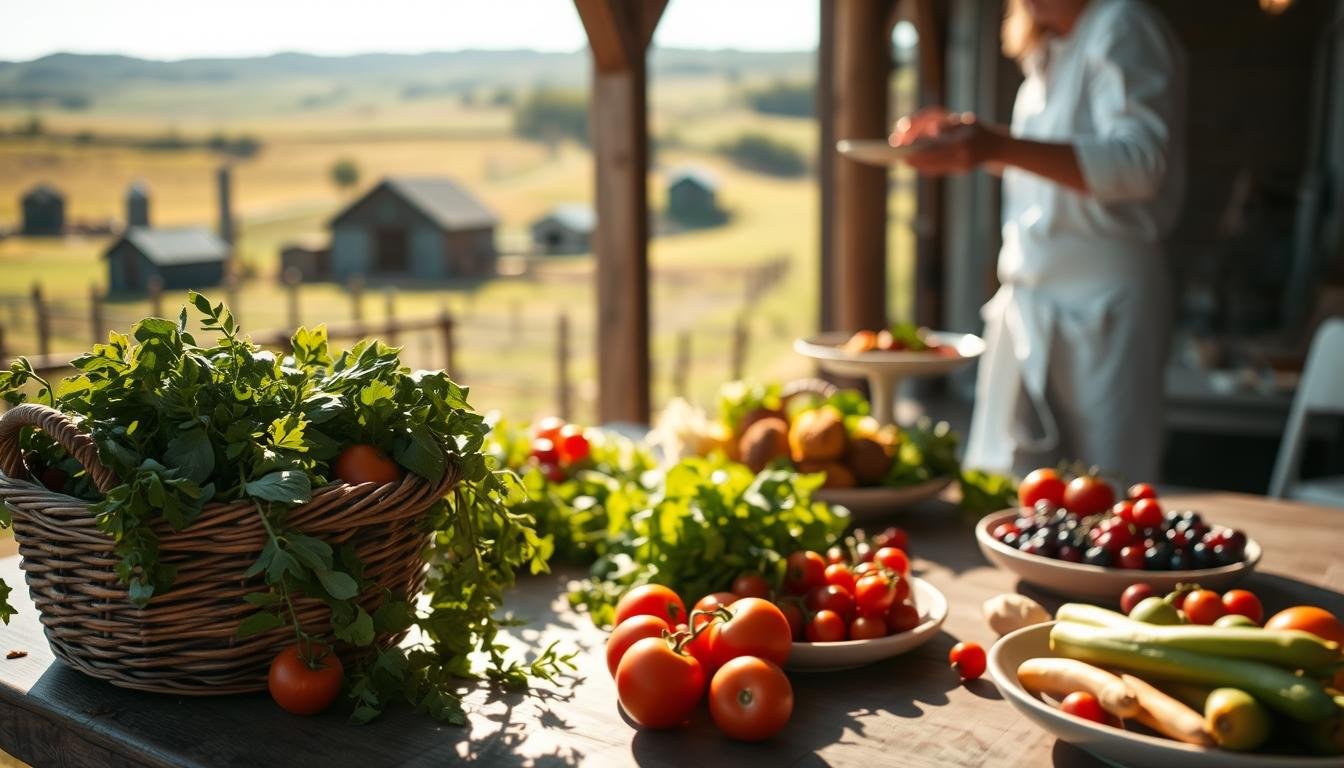Ever thought about eating the freshest food, right from where it’s grown? Culinary travel experiences let you dive into local cultures. You get to meet farmers and chefs who love making food that’s good for you and the planet.
Starting your adventure in farm to table tourism opens up a world of flavors. You’ll learn about local cooking skills and enjoy food that’s in season. This guide will show you how to plan your trip, find the best places, and travel responsibly.
Key Takeaways
- Discover the best destinations for farm-to-table travel
- Learn how to plan your trip and engage with local farmers and chefs
- Adopt responsible tourism practices that support sustainable cuisine
- Explore the richness of local culinary expertise
- Savor the freshest ingredients and authentic flavors of a region
What is Farm-to-Table Tourism?
Farm-to-table tourism connects travelers with local food systems. It offers a real culinary experience. This movement supports sustainable agriculture and local economies.
Definition and Origins
Farm-to-table tourism focuses on local produce. It goes from the farm to your table. This idea comes from the farm-to-table movement.
This movement started because people wanted to know where their food comes from. They wanted to see the effort behind it.
The Rise of Local Foods
Local food adventures are becoming popular. People want to see how food is made. They visit farms, take cooking classes, and eat at local restaurants.
Agritourism destinations are growing. Places around the world are showing off their food. This supports local economies and keeps culinary traditions alive.
The Benefits of Farm-to-Table Travel
Choosing farm-to-table experiences is great for your taste buds and the planet. It combines food exploration with community involvement. This offers many benefits for both travelers and local communities.
Supporting Local Economies
Farm-to-table tourism boosts local economies by promoting local goods. It helps keep family farms and businesses alive.
By joining farm-to-table tours, your money helps local farmers and artisans. This support lets farmers keep their land and continue sustainable farming.
Health Advantages of Fresh Produce
Fresh, seasonal produce is super good for you. It’s full of nutrients and antioxidants.
Eating local food means you get the best nutrition. It makes meals better and improves your health.
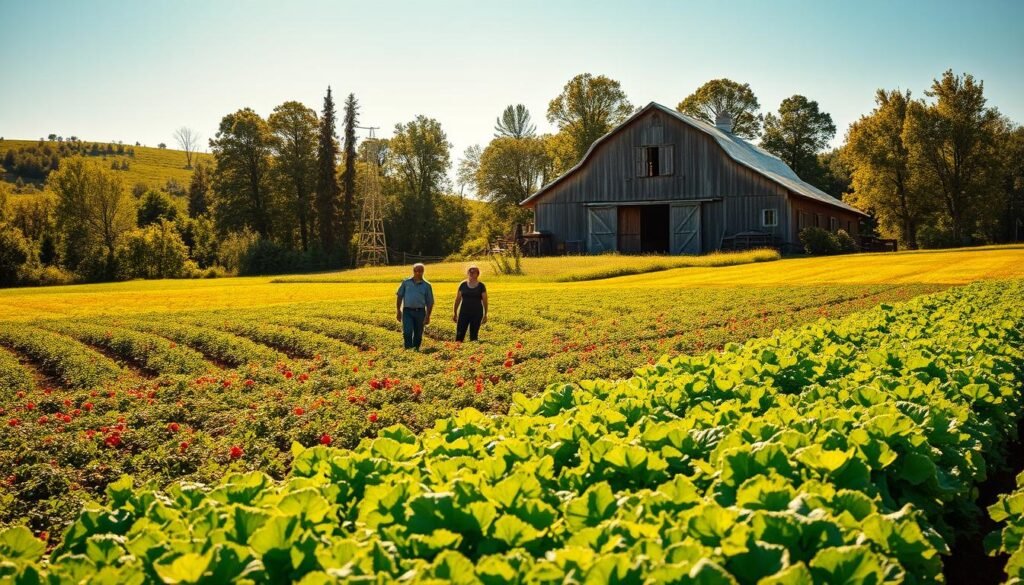
Sustainable Practices in Agriculture
Sustainable farming is key in farm-to-table tourism. It keeps soil healthy, saves water, and cuts down on carbon emissions.
| Sustainable Practice | Benefit | Impact on Farm-to-Table |
|---|---|---|
| Organic Farming | Reduces chemical use | Healthier produce for consumers |
| Crop Rotation | Improves soil health | Increases crop yield and quality |
| Water Conservation | Reduces water waste | Ensures sustainable water use |
Top Destinations for Farm-to-Table Tours
Farm-to-table tourism is becoming more popular. The U.S. has many top spots for organic farm tours and rural gastronomy experiences. These places offer a mix of local food, fresh produce, and hands-on culinary adventures. They highlight the best of American food culture.
Napa Valley, California
Napa Valley is famous for its vineyards and fine dining. Guests can try wine tastings and farm-to-table dinners at top wineries and restaurants. The area’s rich soil and climate are perfect for growing many crops, from grapes to fresh veggies.
Asheville, North Carolina
Asheville has a lively food scene focused on local and sustainable foods. It’s surrounded by organic farms and artisanal food producers. Visitors can explore farm tours, cooking classes, and more, making it a paradise for food lovers.
Oregon’s Willamette Valley
Willamette Valley is known for its beautiful views and fertile land. It’s a top spot for farm-to-table tourism. The area is famous for Pinot Noir vineyards and organic farms that grow fruits, veggies, and artisanal goods. Visitors can enjoy wine tastings, farm tours, and gourmet meals featuring the region’s best produce.
Unique Culinary Experiences to Try
Farm-to-table travel lets you dive into local food culture. You can enjoy farm dinners and cooking classes. These experiences help you appreciate the region’s produce and the farmers who grow it.
Farm Dinners and Chef Collaborations
Farm dinners are a highlight of farm-to-table travel. Chefs team up with local farmers to create amazing meals. These dinners are often held in beautiful places like vineyards or rustic farms.
Imagine dining at a dinner hosted by a famous chef. They work with local farmers to make a menu that highlights the season’s best produce. These dinners are unforgettable and help local economies.
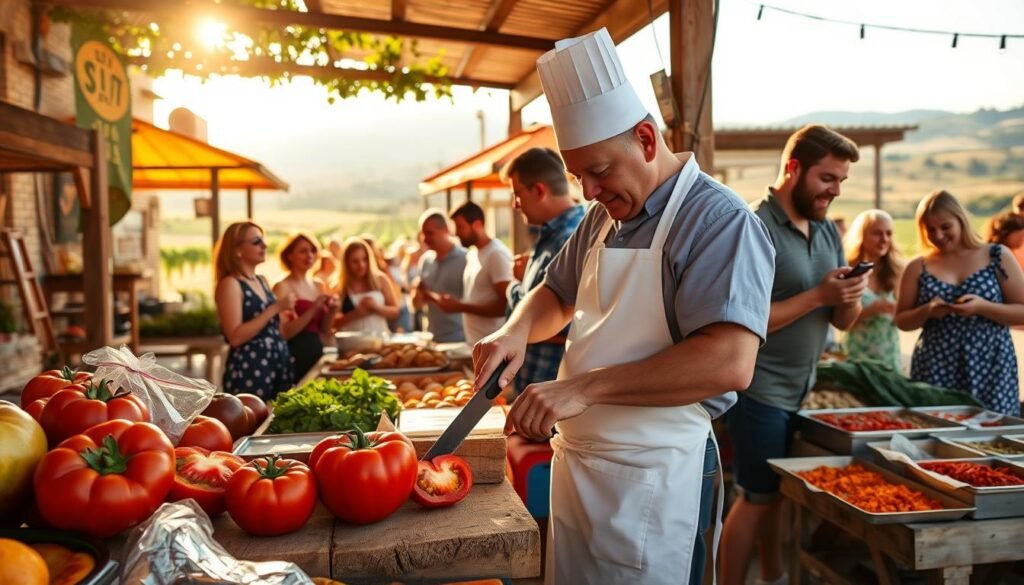
Interactive Cooking Classes
Interactive cooking classes are a fun way to learn about local food. Led by skilled chefs, you’ll learn to make traditional dishes with fresh, local ingredients.
You’ll get to try different cooking methods and learn about regional specialties. Many classes also include visits to local markets or farms. This gives you a full understanding of the ingredients and where they come from.
Winery and Brewery Pairings
Exploring local beverages is a must. Winery and brewery pairings let you taste the region’s best wines and craft beers. They’re often paired with dishes inspired by the local flavors.
Many vineyards and breweries now focus on sustainability. Visiting them is not only fun but also good for the environment. You’ll see how different drinks enhance the local flavors, making your experience even better.
| Culinary Experience | Location | Highlights |
|---|---|---|
| Farm Dinners | Napa Valley, California | Chef collaborations, seasonal produce |
| Interactive Cooking Classes | Asheville, North Carolina | Hands-on learning, local ingredients |
| Winery Pairings | Oregon’s Willamette Valley | Sustainable practices, wine tastings |
Seasonal Ingredients: What to Look For
Exploring farm-to-table cuisine means knowing the seasonal ingredients. Each season brings fresh produce that defines farm-to-table food. From spring’s greens to fall’s harvests, every season adds unique flavors.
Spring Showcases
Spring brings renewal, with fresh greens, herbs, and early fruits. Highlights include:
- Asparagus: A spring favorite, often grilled or roasted to highlight its sweetness.
- Strawberries: Sweet and juicy, strawberries are a spring staple, enjoyed fresh or in desserts.
- Morel mushrooms: Known for their unique flavor and texture, morels are a spring delicacy.
Summer Bounty
Summer offers a wealth of fruits and vegetables, showcasing peak freshness and flavor. Highlights include:
- Tomatoes: Cherry tomatoes or heirloom varieties, summer tomatoes are essential in farm-to-table meals.
- Corn: Fresh corn on the cob is a summer treat, often grilled or boiled to enjoy its sweetness.
- Stone fruits: Peaches, nectarines, and plums are at their peak in summer, enjoyed fresh or in desserts.
Fall Harvest Treats
Fall focuses on root vegetables, squashes, and apples. Favorites include:
- Pumpkins and squashes: Used in soups, pies, and as decorations, these are versatile and flavorful.
- Apples: From Granny Smith to Honeycrisp, apples are a fall delight.
- Brussels sprouts: Often roasted or sautéed, Brussels sprouts are a fall favorite side dish.
Understanding seasonal ingredients deepens your connection to local food. It allows you to enjoy the rich flavors of farm-to-table tourism.
How to Plan Your Farm-to-Table Tour
To enjoy your farm-to-table tour, planning is key. You need to follow a few steps. This will make your trip fun and educational.
Researching Local Farms and Restaurants
Start by looking up local farms and restaurants that support farm-to-table. Look for agritourism destinations that offer real experiences. This could be farm visits, harvest festivals, or cooking classes with local ingredients.
Use websites and travel blogs for tips and recommendations. Social media can also help you find top-rated local spots. Read reviews to know what to expect.
Booking Tours in Advance
After picking your places, book your tours early. Popular spots fill up fast, especially when it’s busy. Booking early secures your spot and helps plan your trip better.
Reach out to local tour operators for sustainable agriculture experiences. They can guide you through local farming and food traditions.
Considering Transportation Options
Think about how you’ll get from one place to another. Public transport might not be available, so renting a car or a private service might be needed. Some tours include transport, which is handy.
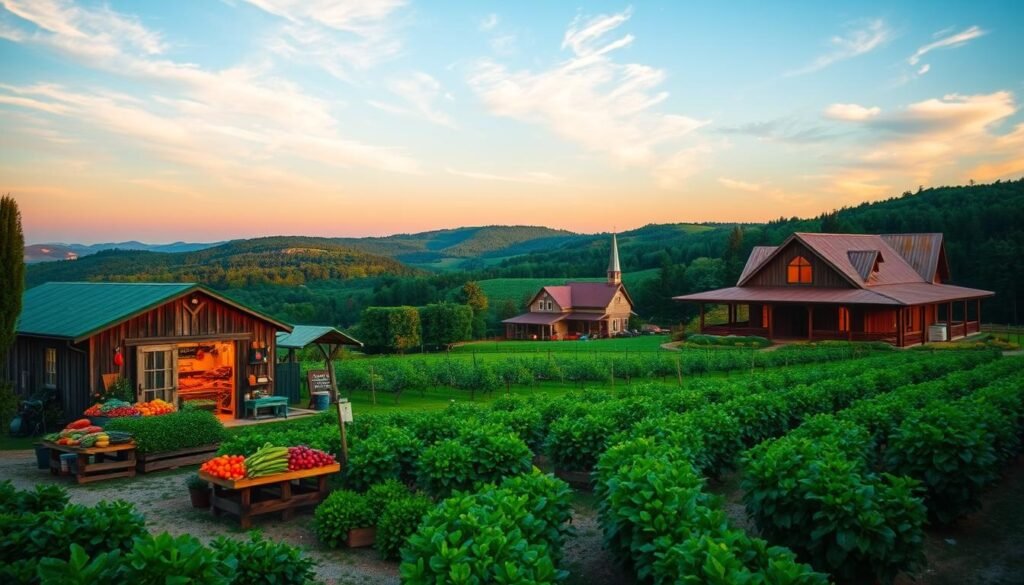
By researching, booking early, and planning transport, you’ll have a great farm-to-table tour. It’s a memorable trip that supports local farmers and promotes sustainable agriculture practices.
Engaging with Farmers and Chefs
Farm-to-table travel is all about making real connections. You get to meet the people who grow and cook your food. This lets you understand the local food traditions and practices better.
The Importance of Personal Connections
Personal connections make a farm-to-table trip unforgettable. By visiting farms, taking cooking classes, or eating at chef-owned places, you do more than just eat. You connect with the community.
These interactions give you a true taste of the place. You learn about the food producers’ challenges and successes.
Here are some ways to make these connections:
- Visit local farms to see how food is grown and picked
- Join cooking classes with local chefs to learn their secrets
- Eat at places that use local ingredients
Learning Directly from Producers
Learning from farmers and chefs is incredibly valuable. You get to see how sustainable farming works and why seasonal food matters. You also learn how to make menus that highlight local tastes.
Benefits of Learning from Producers:
- You’ll appreciate the hard work and skill in local food production more
- You’ll pick up new cooking skills and recipes to try at home
- You’ll see how supporting local food helps the economy
Exploring these opportunities makes your trip more than just a food tour. It’s a journey into the heart of the local food scene.
By following the farm-to-table way, you enjoy tasty, local meals and help a sustainable food system. When planning your next food adventure, think about meeting farmers and chefs. These personal connections can make your trip even more special.
Responsible Tourism Practices
Farm-to-table tourism is more than just tasting local foods. It’s about respecting the environment and culture of the places we visit. As you enjoy rural gastronomy experiences, remember your actions have an impact.
Traveling for food is not just about taste. It’s about connecting with the people and places that make these moments special. So, it’s important to travel responsibly to help local communities thrive.
Cultural Sensitivity
Respecting local cultures is essential for responsible travel. This means knowing and following local customs and traditions. For example, when visiting farms or cooking classes, dress right and respect any unfamiliar rules.
Talking to local farmers and chefs can deepen your cultural understanding. Showing genuine interest and gratitude can make your visit and theirs more rewarding.
| Cultural Practice | Description | Tips for Visitors |
|---|---|---|
| Dress Code | Understanding local dress norms | Dress modestly, especially when visiting farms or local homes |
| Local Customs | Respecting traditions and norms | Be observant and follow local leads when participating in cultural activities |
Minimizing Environmental Footprint
Reducing your environmental impact is key to responsible travel. Simple steps like reducing waste, using public transport, and choosing eco-friendly accommodations can help.
When enjoying culinary travel experiences, think about the environmental effects of your food choices. Choose local produce, reduce food waste, and support restaurants that care for the planet.
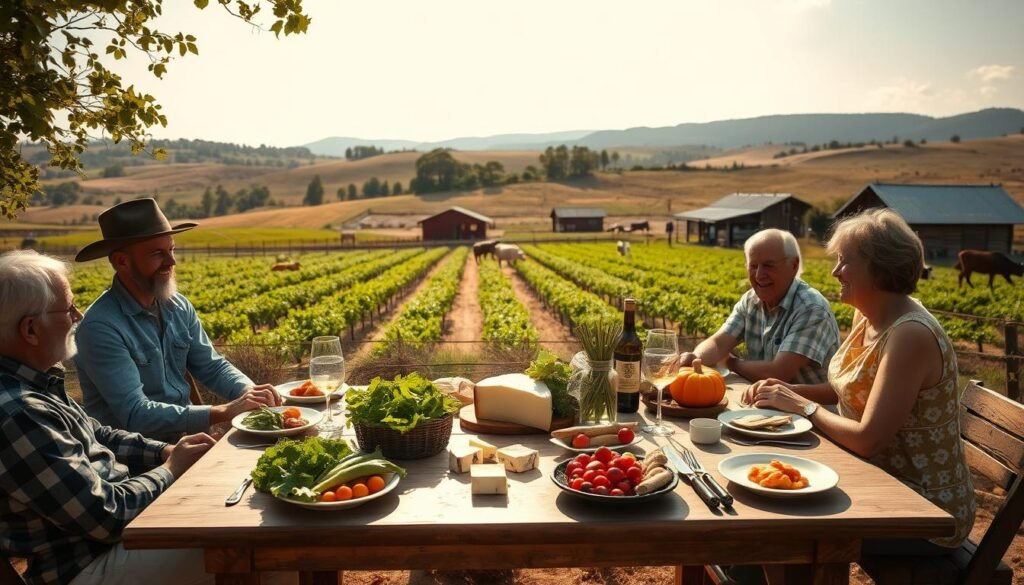
By following these tips, you improve your culinary travel experiences and help preserve the places you visit. Responsible tourism aims to leave a positive mark, ensuring local cultures and environments are protected for the future.
Preparing for Your Culinary Adventure
Getting ready for your farm-to-table tour is exciting. Think about what you need to make your experience better. Whether you’re into local food adventures or just want fresh produce, being ready is important.
Practical Tips for Travelers
Wear comfy clothes and shoes for farm visits and walks. Bring a reusable water bottle to stay hydrated and help the environment.
Capturing Your Experience
Food lovers should capture the beauty of local dishes. Use a good camera or smartphone to take photos of food and views. Pay attention to lighting and how things are arranged to make your photos great.
Being prepared and aware of your surroundings helps you enjoy local food adventures more. You’ll make memories that last a lifetime on your farm-to-table tour.
FAQ
What is farm-to-table tourism?
Farm-to-table tourism lets you explore local food systems and sustainable farming. You visit farms, take cooking classes, and eat at places that use local ingredients.
What are the benefits of farm-to-table travel?
It boosts local economies and supports green farming. You get to enjoy fresh food and meet local farmers and chefs. It’s a way to learn about the food culture of your destination.
How do I plan a farm-to-table tour?
First, look up local farms and restaurants. Book your tours early and think about how you’ll get there. Look for tours that focus on organic farming and eco-friendly food.
What are some top destinations for farm-to-table tours?
Napa Valley, California; Asheville, North Carolina; and Oregon’s Willamette Valley are great spots. They offer farm dinners, cooking classes, and wine pairings.
How can I engage with local farmers and chefs during my farm-to-table tour?
Visit farms, join cooking classes, and eat at local restaurants. Many tours let you meet farmers and chefs. This way, you learn about local food and traditions.
What are some responsible tourism practices I can adopt during my farm-to-table tour?
Respect local cultures and try to leave a small environmental footprint. Support local businesses and choose eco-friendly places to stay. Reduce waste and pick green transport options.
What should I bring on my farm-to-table tour?
Pack comfy clothes, a camera for your food adventures, and reusable items to cut down on waste. Learning about local customs will make your trip more enjoyable.

